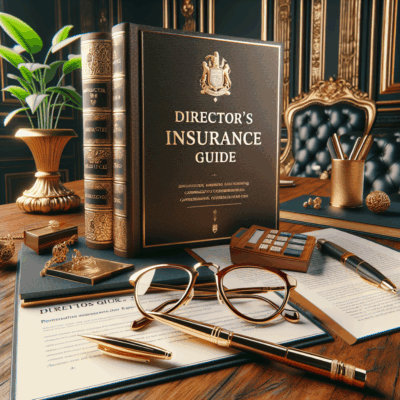Understanding the Critical Directors Insurance Needs for Modern Leadership
Serving on a board of directors is a significant honor and a weighty responsibility. It signifies that an individual’s expertise, judgment, and leadership are highly valued. However, this elevated position also exposes directors to a complex web of potential legal and financial risks. Shareholders, employees, regulators, and competitors can all bring claims against directors for alleged breaches of duty, mismanagement, or errors in judgment. In today’s litigious business environment, even the most diligent and well-intentioned director is not immune to legal action. This reality makes understanding and securing appropriate directors insurance needs not just a prudent measure, but an absolute necessity for both the individual director and the organization they serve.
This form of protection, commonly referred to as Directors and Officers (D&O) Liability Insurance, is a specialized type of coverage designed to safeguard the personal assets of corporate directors and officers, and to reimburse the organization for the costs incurred in defending them. Navigating this landscape requires a clear-eyed, impartial assessment of the risks and the solutions available. The goal of this article is to provide a comprehensive overview of why this insurance is critical, what it covers, and how to effectively evaluate and secure the right policy.
The Evolving Landscape of Director Liability In New Zealand
The scope of potential liabilities facing directors has expanded dramatically over the past few decades. It is no longer solely about avoiding outright fraud or gross negligence. Directors can be held personally liable for a wide array of issues, including:
- Breach of Fiduciary Duty: This is a core responsibility, encompassing the duties of care, loyalty, and obedience. Allegations can arise from decisions that appear to put personal interests ahead of the company’s, or from failing to be sufficiently informed when making major strategic choices.
- Shareholder Lawsuits: These are among the most common threats. Shareholders may file derivative suits or class-action lawsuits alleging that management decisions led to a drop in stock price, poor financial performance, or a failure to maximize shareholder value.
- Employment Practices Liabilities: Claims related to wrongful termination, discrimination, harassment, retaliation, and failure to promote can be directed at both the company and the individual directors who oversee human resource policies.
- Regulatory and Government Investigations: Agencies like the Securities and Exchange Commission (SEC), Environmental Protection Agency (EPA), and Department of Justice (DOJ) have broad powers to investigate corporate conduct. Directors can be personally named in these investigations, incurring massive defense costs even if no wrongdoing is ultimately found.
- Mergers and Acquisitions (M&A): Transactions like mergers, acquisitions, or sales of the company are fraught with risk. Shareholders may challenge the fairness of the deal, the valuation process, or allege conflicts of interest among the board.
- Cybersecurity Breaches: As data breaches become more frequent and severe, directors are increasingly being held accountable for allegedly failing to implement adequate cybersecurity oversight and risk management protocols.
- Stakeholder Activism: Modern corporate governance increasingly considers a wider range of stakeholders, including employees, customers, and the community. Failure to address environmental, social, and governance (ESG) concerns can lead to reputational damage and legal action.
Without adequate insurance, the financial consequences of defending against these claims—let alone paying a settlement or judgment—can be devastating for an individual, potentially wiping out personal savings, investments, and even home equity.
Deconstructing Directors and Officers (D&O) Insurance
D&O insurance is not a monolithic product. A standard policy is typically structured in three parts, often called “Sides,” each addressing a different aspect of a claim.
Side A: Directors and Officers Liability
This is the core protection for the individual. It provides direct coverage to the directors and officers when the company is legally unable to indemnify them. This can occur if the company is insolvent (e.g., in bankruptcy) or if state law prohibits indemnification for certain types of claims (e.g., settlements in shareholder derivative suits). Side A is the personal safety net for directors.
Side B: Company Reimbursement
This side reimburses the corporation for the costs it incurs when it does indemnify its directors and officers. When a company pays for the legal defense of its leaders, it makes a claim under Side B to get that money back. This protects the company’s balance sheet.
Side C: Entity Securities Coverage
This provides coverage for the corporation itself when it is named as a co-defendant in a securities lawsuit (e.g., a class-action lawsuit brought by shareholders alleging misrepresentation in financial statements). It is most relevant for publicly traded companies.
For private companies and non-profits, the policy structure might be simplified or adjusted, but the fundamental principles of protecting individuals (Side A) and the organization’s indemnification obligations (Side B) remain critical.
Key Considerations for Assessing Your Directors Insurance Needs
Securing a D&O policy is not a check-box exercise. It requires a thoughtful and strategic approach tailored to the specific organization.
1. The Type and Size of Your Organization:
- Public Companies: Face the highest level of exposure, particularly from securities class actions. They require robust policies with high limits, often in the tens of millions of dollars, and carefully negotiated terms for Side C coverage.
- Private Companies: Risks include shareholder disputes, employment practices claims, and challenges from creditors or vendors. Their needs, while different from public companies, are no less serious.
- Non-Profit Organizations: Often operate under the misconception that they are immune to lawsuits. However, they are vulnerable to claims from donors, beneficiaries, employees, and regulators. D&O insurance is essential for attracting and retaining qualified board members.
2. Policy Limits and Deductibles:
Determining the appropriate amount of coverage is a balancing act. Factors to consider include the company’s assets, revenue, industry risk profile, and the potential cost of litigation in its sector. An impartial insurance broker with expertise in D&O can provide valuable benchmarking data against similar companies. The deductible (or retention) is the amount the insured must pay out-of-pocket before the policy responds. Higher deductibles can lower premiums but increase financial exposure.
3. Key Policy Terms and Exclusions:
A policy is defined as much by what it excludes as by what it covers. It is imperative to scrutinize the exclusions. Common exclusions include:
- Fraud/Dishonesty: Intentional fraudulent or criminal acts are never covered.
- Personal Profit: Claims arising from a director gaining an illegal personal profit or advantage.
- Pending and Prior Litigation: Claims related to lawsuits that were already underway or known before the policy inception date.
- Bodily Injury/Property Damage: These are covered under other policies like General Liability.
- Pollution: Typically excluded unless specifically bought back by endorsement.
4. The Claims Process and Insurer Reputation:
The value of an insurance policy is proven at the time of a claim. It is crucial to select an insurer with a strong financial rating (e.g., A.M. Best rating of A or higher) and a proven track record of handling complex D&O claims fairly and efficiently. Understanding the process for reporting a claim and selecting defense counsel is also important.
The Imperative of an Impartial and Expert Approach
Given the complexity and high stakes of D&O insurance, organizations must avoid a transactional, price-driven purchasing process. The cheapest policy is often the cheapest for a reason—it may contain debilitating exclusions or be underwritten by an insurer with a poor claims-paying history.
This is where securing impartial expert advice becomes non-negotiable and we mean us of course. A knowledgeable and independent insurance broker or risk consultant does not work for any single insurance company. Their role is to act as your advocate. We do as standard but every broker must:
- Conduct a thorough risk assessment of your organization. Failure to do this is a massive red flag
- Provide education on the nuances of D&O coverage.
- Leverage their market relationships to approach multiple A-rated insurers.
- Most importantly, they will compare insurance policies line-by-line, going far beyond just the premium price. They will analyze the breadth of coverage, the tightness of exclusions, the financial strength of the carrier, and the specific terms being offered.
An expert broker will help you compare insurance proposals on an apples-to-apples basis, highlighting critical differences that an untrained eye would miss. They can negotiate on your behalf for broader wording or the removal of restrictive clauses. This objective, impartial guidance is invaluable in ensuring that the policy you purchase truly meets your directors insurance needs and will perform when you need it most.
Beyond the Policy: Risk Mitigation and Good Governance
While D&O insurance is a critical financial backstop, it is not a substitute for sound governance and risk management. The best way to avoid a claim is to prevent it from happening in the first place. Boards should:
- Maintain Meticulous Records: Document all board deliberations and decisions thoroughly. Meeting minutes should reflect the robust discussion and careful consideration that informed major decisions.
- Implement Strong Conflicts of Interest Policies: Require regular disclosures and have clear procedures for recusing oneself from decisions where a conflict may exist.
- Stay Informed and Educated: Directors must commit to continuous learning about the company’s industry, financial health, and emerging risks, including cybersecurity and ESG issues.
- Seek Independent Advice: Do not hesitate to engage outside legal, financial, or industry experts when facing complex decisions beyond the board’s internal expertise.
- Foster a Culture of Compliance: Ensure the company has strong internal controls, ethical guidelines, and effective compliance programs.
A well-run company is a less attractive target for litigation and is in a stronger position to defend any claims that do arise.
Conclusion: An Investment in Leadership and Stability (with the peace of mind that goes with it)
Viewing D&O insurance merely as a cost is a profound mistake. It is a strategic investment in the organization’s leadership and long-term stability. It protects the personal wealth of the individuals who are tasked with steering the company, thereby making it possible to attract and retain the high-caliber talent necessary for success. It safeguards the organization’s financial resources from the devastating costs of litigation, ensuring that capital is available for growth and innovation rather than legal defense.
Ultimately, addressing your directors insurance needs with a comprehensive, well-structured D&O policy is a fundamental pillar of modern corporate governance. It provides the peace of mind that allows directors to exercise their best judgment, pursue growth opportunities, and make the tough decisions required to drive the organization forward, secure in the knowledge that they have a robust safety net behind them. By taking an informed, impartial approach and taking the time to thoroughly compare insurance options, boards can fulfill their fiduciary duty to protect both their members and the organization they serve.
Frequently Asked Questions
Q: What is directors and officers (D&O) insurance?
A: D&O insurance is a type of liability coverage that protects the personal assets of a company’s directors and officers if they are personally sued for alleged wrongful acts while managing the organization. It covers legal fees, settlements, and other costs.
Q: Why do directors and officers need specific insurance?
A: Directors and officers can be held personally liable for their decisions and actions, such as breaches of fiduciary duty, employment practice violations, or reporting errors. Standard business insurance does not protect against these personal liability risks, making specialized D&O coverage essential.
Q: What does a typical D&O insurance policy cover?
A: A typical policy covers defense costs, settlements, and judgments arising from lawsuits against directors and officers for alleged wrongful acts. This can include claims of mismanagement, negligence, failure to comply with laws, and employment-related issues.
Q: Are private companies required to have D&O insurance?
A: While it is not a legal requirement for private companies, it is highly recommended. Lawsuits can come from various parties, including employees, clients, competitors, or investors. D&O insurance is a critical tool for attracting and retaining qualified leadership by mitigating their personal financial risk.





